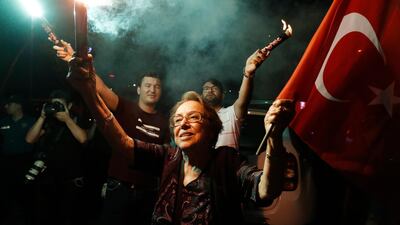Following the results of the Istanbul mayoral election rerun and the decisive victory of opposition candidate Ekrem Imamoglu, many Istanbul neighbourhoods were jubilant. There were car horns, fireworks, live music and dancing. Like at weddings and big birthday parties, strangers hugged, smiling was mandatory and children were allowed to stay up past their bedtime.
There was plenty to celebrate. Representing the Republican People's Party (CHP), Mr Imamoglu's first narrow victory on March 31 had been annulled by the Supreme Electoral Council, after immense government pressure. Nevertheless, President Recep Tayyip Erdogan's preferred candidate, Binali Yildirim, a former prime minister and important figure in Mr Erdogan's Justice and Development Party (AKP), was roundly defeated for the second time.
This time around, 54.2 per cent of Istanbul residents voted for Mr Imamoglu. Mr Yildirim received just 45 per cent. In other words, Mr Imamoglu managed to attract 800,000 more voters than before. His campaign slogan, which roughly translates to “Everything will be fine” proved prescient.
It is hard to downplay Mr Imamoglu’s success. With 90 per cent of the media pro-AKP and the with the full support of the president, Mr Yildirim enjoyed obsequious press coverage and well-endowed finances. He didn’t have to contend with slurs, either. Mr Imamoglu, on the other hand, was accused of being secretly Greek, in receipt of support by militant Kurds, and of having links to members of the Gulen movement – a transnational organisation led by the exiled cleric Fethullah Gulen, which Mr Erdogan holds responsible the attempted 2016 coup against him.
If that were not enough, Mr Erdogan even tried to split Kurdish support for Imamoglu by getting Abdullah Ocalan, the imprisoned leader of the separatist Kurdistan Workers Party (PKK), to write a letter calling for eligible Kurdish voters to be neutral.
By losing Istanbul, the AKP government has lost access to the city's $4 billion budget and the ability to maintain its extensive patronage network. Just as importantly, the position of Istanbul mayor is a potential springboard for higher office. Just ask Mr Erdogan. He once held the position.
There is already talk of Mr Imamoglu running for president in 2023. After all, his election victory proves that he has the ability to attract votes across a diverse range of communities and perspectives. Some commentators have intimated that this could mark the beginning of the end of Mr Erdogan’s presidency. The reality is, however, less climactic.
Mr Erdogan remains very popular. During last year’s presidential election, he gained 52 per cent of the vote and won in the first round. His nearest rival only managed 30 per cent of the final tally.
There will not be another national election until 2023, and Mr Erdogan has carved out for himself a position of more or less absolute political power after winning a 2017 referendum that ushered in sweeping constitutional changes. He controls the armed forces and security services. He chooses government ministers and can fire them at will. He appoints half of the high court, and his loyalists dominate the judiciary. The media toes Mr Erdogan’s lines, and it is he who sets the budget and has veto power over legislation. He can even pass decrees and dismiss parliament. Anyone who opposes Erdogan faces an uphill struggle.
It is worth remembering that, despite losing Istanbul, the AKP also remains popular, with 45 per cent of Istanbul residents voting for Mr Yildirim on Sunday. Not enough to win, but not bad, considering that he is a pretty uninspiring politician. His delivery is monotone and he comes across dull and characterless. Mr Erdogan’s blunder was underestimating Imamoglu and fielding Mr Yildirim in the first place.
During the 2018 parliamentary elections, the AKP won 42.5 per cent of the popular vote, a figure consistent with prior elections. In 2018, the AKP forged an alliance with the far-right Nationalist Movement Party (MHP) which gave Mr Erdogan’s bloc 52.5 per cent of the popular vote and an absolute majority in the country’s parliament.
Even alone, the AKP boasts consistent baseline support of 40 per cent, which is extremely hard to beat.
Despite the CHP’s alliance with the liberal-conservative nationalist Iyi party, the Islamist-conservative Felicity Party and the liberal and Kurdish-oriented Peoples’ Democratic Party (HDP), the opposition bloc only managed to win around 34 per cent of the popular vote.
There are rumours circulating that former high-ranking members of the AKP, including Ahmet Davutoglu, Abdullah Gul and Ali Babacan – who have held the positions of prime minister, president and finance minister, respectively – might break away, either together or separately, to form their own political parties. That would be a setback for Mr Erdogan and the AKP. However, stories about AKP notables jumping ship and starting their own parties have circulated for years, but have still not happened. It seems that the majority think that it is better to be in government that out.
However, one of the reasons for the AKP’s success over the years has been its management of the economy and effective delivery of services, both locally and nationally. The opposition, which now has mayors in three of Turkey’s five largest cities – Istanbul, Ankara and Izmir – has the opportunity to show that it can do the same if not better, especially as Turkey’s economic downturn continues.
Of course, the opposition will face resistance from the AKP leadership, who will try to cripple municipal funding and make basic governance a chore. But, in these important local positions of power, the CHP has a chance to make a difference. If successful, the party might even give Mr Erdogan a run for his money in 2023. That’s a possibility many find worth celebrating.
Dr Simon A. Waldman is an associate fellow at the Henry Jackson Society and a visiting research fellow at King's College London. He is the co-author of The New Turkey and Its Discontents

